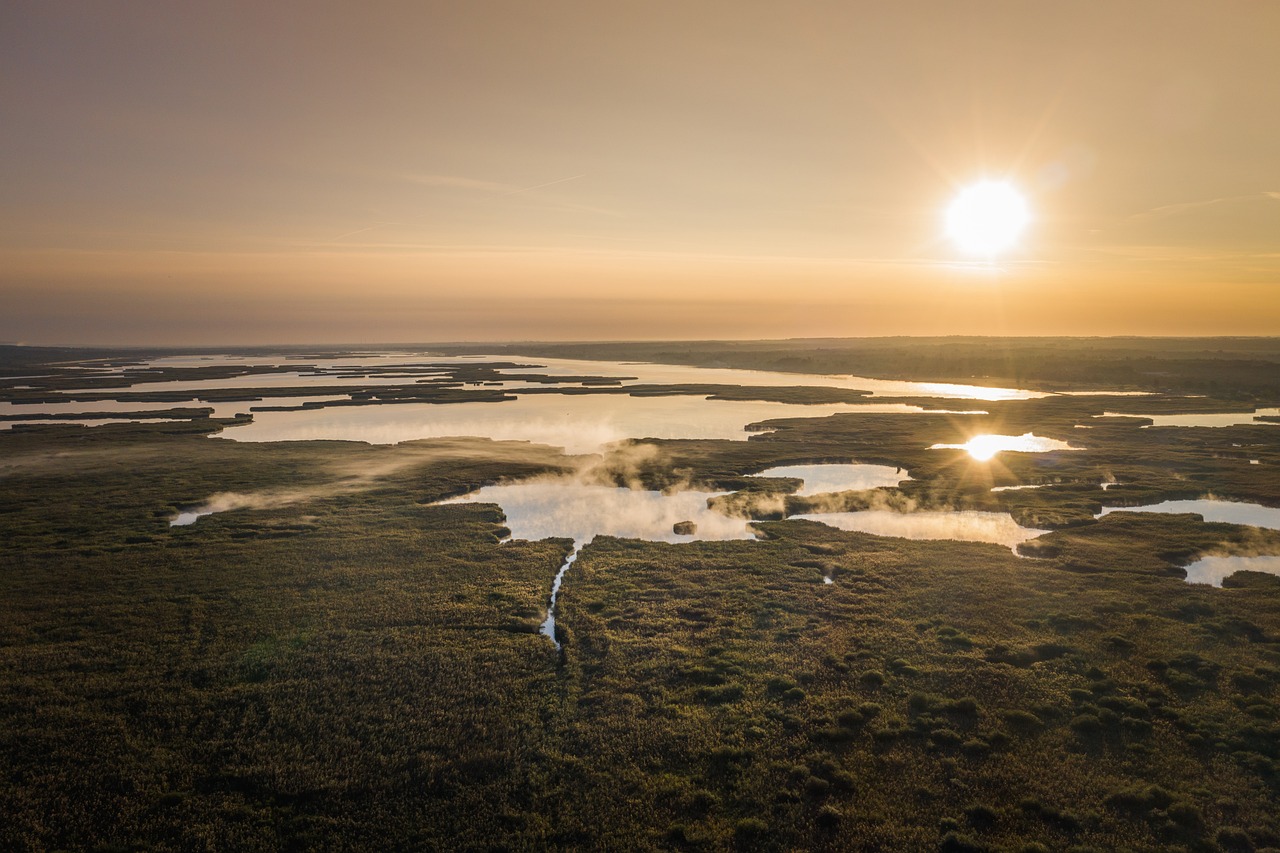What Role Does Eco-Tourism Play in Conserving Environment?
Eco-tourism is more than just a travel trend; it's a movement that intertwines adventure with responsibility. Imagine stepping into a lush rainforest, where the air is thick with the scent of damp earth and the sounds of wildlife surround you. This experience is not just about enjoyment; it’s about conserving our planet while exploring its beauty. Eco-tourism plays a pivotal role in environmental conservation by encouraging sustainable practices that benefit both travelers and local ecosystems. But how exactly does it contribute to safeguarding our environment?
At its core, eco-tourism promotes a deep respect for nature and a commitment to preserving it. When travelers engage in eco-friendly practices, they help to reduce the ecological footprint often associated with traditional tourism. This means fewer carbon emissions, less waste, and a greater focus on conservation efforts. By choosing eco-tourism, individuals are not just passive observers of nature; they become active participants in its preservation.
One of the most significant aspects of eco-tourism is its ability to generate funds for conservation initiatives. Through entrance fees, donations, and eco-friendly activities, eco-tourism can provide vital resources for protecting endangered species and restoring habitats. For instance, many eco-lodges allocate a portion of their profits to local conservation projects, ensuring that the environment is not only enjoyed but actively protected. This creates a win-win situation for both travelers and the environment.
Moreover, eco-tourism fosters a sense of community and cultural exchange. When travelers visit local communities, they often engage with the residents, learn about their traditions, and support their livelihoods. This interaction not only enriches the travel experience but also empowers local populations to take an active role in protecting their natural surroundings. By promoting local culture and sustainable practices, eco-tourism helps to create a cycle of respect and conservation.
However, the journey of eco-tourism is not without its challenges. Issues like over-tourism can lead to environmental degradation, undermining the very principles eco-tourism stands for. It’s crucial for both travelers and operators to be mindful of their impact on the environment. Sustainable management practices, such as limiting visitor numbers in sensitive areas, can help mitigate these risks. After all, the goal is to preserve the beauty of our planet for future generations.
As we look towards the future, the role of eco-tourism in environmental conservation is more important than ever. With the world facing pressing challenges like climate change and biodiversity loss, eco-tourism offers a pathway to a more sustainable future. By embracing innovation and adaptability, the industry can continue to thrive while championing the cause of conservation.
- What is eco-tourism? Eco-tourism is a responsible travel approach that emphasizes conservation, education, and community engagement, aiming to minimize the ecological footprint while providing immersive experiences in natural environments.
- How does eco-tourism benefit local communities? Eco-tourism generates income through job creation and supports local businesses, leading to improved living standards and increased investment in conservation efforts.
- What are the challenges facing eco-tourism? Challenges include over-tourism, environmental degradation, and the risk of commodifying nature, which can undermine the integrity of eco-tourism.
- How can travelers contribute to eco-tourism? Travelers can choose eco-friendly accommodations, participate in conservation activities, and respect local cultures and environments to support sustainable practices.

Understanding Eco-Tourism
Eco-tourism is more than just a trendy travel buzzword; it embodies a responsible approach to travel that prioritizes the health of our planet. Imagine stepping into a lush rainforest, surrounded by the sounds of nature, where every step you take contributes to the preservation of that environment. This is the essence of eco-tourism—it's about immersing yourself in natural beauty while ensuring that your presence positively impacts the ecosystem.
At its core, eco-tourism is about conservation, education, and community engagement. It encourages travelers to explore the world while being mindful of their ecological footprint. By focusing on sustainability, eco-tourism aims to minimize the negative effects of tourism on the environment, allowing future generations to enjoy the same breathtaking landscapes and diverse wildlife that we cherish today.
One of the key principles of eco-tourism is the commitment to educating travelers about the local environment and the challenges it faces. This education fosters a deeper appreciation for nature and encourages visitors to become advocates for conservation. When travelers understand the delicate balance of ecosystems, they are more likely to support initiatives that protect these precious resources.
Moreover, eco-tourism promotes community engagement by involving local populations in tourism activities. This not only empowers communities economically but also gives them a voice in how their natural resources are managed. By participating in eco-tourism, travelers can support local cultures and traditions while contributing to the preservation of the environment.
In summary, eco-tourism is a holistic approach to travel that emphasizes the importance of protecting our planet while providing enriching experiences for travelers. It invites us to explore the world responsibly and encourages us to leave a positive impact wherever we go. So, the next time you plan a trip, consider how you can embrace eco-tourism practices and become a steward of the environment.

Benefits of Eco-Tourism
Eco-tourism is not just a trend; it's a movement that brings with it a plethora of benefits for the environment, local communities, and travelers alike. First and foremost, eco-tourism promotes environmental protection by encouraging sustainable practices that help preserve natural habitats. When travelers choose eco-friendly options, they contribute to the conservation of ecosystems that are often under threat from urbanization and industrialization. This conscious choice to travel responsibly means that every step taken in nature is a step toward protecting our planet.
One of the most significant advantages of eco-tourism is its ability to provide economic support to local communities. When tourists visit a region, they often spend money on local services, food, and crafts, which helps stimulate the local economy. This influx of cash can lead to improved living standards for residents, who can then invest in their communities and conservation efforts. In fact, many eco-tourism initiatives are designed to ensure that a substantial portion of the profits goes directly back into local projects, creating a sustainable cycle of economic growth and environmental stewardship.
Moreover, eco-tourism plays a vital role in promoting biodiversity. By attracting visitors to natural areas, eco-tourism raises awareness about the importance of preserving these environments. Tourists often leave with a deeper understanding of the local flora and fauna, fostering a sense of responsibility towards conservation. This educational aspect is crucial; when people appreciate the beauty and complexity of nature, they are more likely to support measures that protect it. In essence, eco-tourism transforms travelers into advocates for the environment.
To illustrate the positive impact of eco-tourism, consider the following table that summarizes its key benefits:
| Benefit | Description |
|---|---|
| Environmental Protection | Encourages sustainable practices that help preserve natural habitats. |
| Economic Support | Generates income for local communities, improving living standards. |
| Biodiversity Promotion | Raises awareness about the importance of preserving natural environments. |
| Cultural Exchange | Facilitates interaction between tourists and local communities, fostering mutual respect. |
In addition to these benefits, eco-tourism fosters a unique cultural exchange between travelers and local communities. This interaction not only enriches the travel experience but also promotes understanding and respect for different cultures. When tourists engage with local traditions and practices, they contribute to the preservation of cultural heritage, which can be just as important as protecting the environment.
In conclusion, the benefits of eco-tourism are far-reaching and impactful. By choosing eco-friendly travel options, we can all play a part in protecting the environment, supporting local economies, and promoting biodiversity. So, the next time you're planning a trip, consider how your choices can make a difference—not just for you, but for the planet as well.
- What is eco-tourism? Eco-tourism is a responsible travel approach that emphasizes conservation, education, and community engagement.
- How does eco-tourism benefit local communities? Eco-tourism generates income, creates jobs, and supports local businesses, leading to improved living standards.
- Can eco-tourism help with wildlife conservation? Yes, eco-tourism often funds conservation initiatives, such as wildlife protection and habitat restoration.
- What are some challenges of eco-tourism? Challenges include over-tourism, environmental degradation, and the risk of commodifying nature.

Economic Impact on Local Communities
Eco-tourism is not just a buzzword; it's a lifeline for many local communities around the globe. When travelers choose eco-friendly options, they are essentially voting with their wallets for sustainable practices that benefit both the environment and the locals. This responsible travel approach generates a significant economic impact, creating a ripple effect that uplifts entire communities.
One of the most profound ways eco-tourism supports local economies is through job creation. From tour guides who share their knowledge of the local flora and fauna to artisans selling handcrafted souvenirs, eco-tourism opens up a variety of employment opportunities. These jobs not only provide income but also empower locals by fostering a sense of ownership and pride in their natural resources. In many cases, these positions are more than just jobs; they are a way for individuals to share their culture and heritage with visitors.
Additionally, eco-tourism encourages travelers to engage with local businesses, ensuring that the revenue generated circulates within the community. By dining at local restaurants or staying in family-run lodges, tourists contribute directly to the livelihoods of their hosts. This economic boost can lead to improved living standards, allowing locals to invest in their health, education, and conservation efforts.
| Economic Benefits of Eco-Tourism | Examples |
|---|---|
| Job Creation | Tour guides, hospitality staff, artisans |
| Support for Local Businesses | Restaurants, shops, local markets |
| Infrastructure Development | Improved roads, schools, healthcare facilities |
| Investment in Conservation | Funding for wildlife protection, habitat restoration |
Moreover, the economic impact of eco-tourism extends to infrastructure development. As demand for eco-friendly travel experiences increases, local governments and communities often invest in better roads, schools, and healthcare facilities. This not only enhances the quality of life for residents but also makes the area more attractive to future visitors. It’s a win-win situation!
In conclusion, the economic impact of eco-tourism on local communities is substantial and multifaceted. By choosing eco-tourism, travelers are not just enjoying a unique experience; they are actively participating in the conservation of the environment and the upliftment of local economies. The next time you plan a trip, consider how your choices can make a difference—because every little bit helps!
- What is eco-tourism? Eco-tourism is responsible travel that focuses on conservation, education, and community engagement.
- How does eco-tourism benefit local communities? Eco-tourism creates jobs, supports local businesses, and leads to infrastructure development.
- Can eco-tourism help with conservation efforts? Yes, eco-tourism often funds wildlife protection and habitat restoration projects.
- What challenges does eco-tourism face? Challenges include over-tourism, environmental degradation, and the risk of commodifying nature.

Job Creation in Eco-Tourism
Eco-tourism is more than just a buzzword; it's a powerful engine for job creation that resonates deeply within local communities. Imagine stepping into a lush rainforest or a serene beach, and the friendly face greeting you is not just a tour guide but a local who has a genuine connection to the land. This is the essence of eco-tourism—providing employment opportunities that empower individuals and foster a sense of stewardship over their natural resources.
When travelers choose eco-tourism, they are not only enjoying breathtaking landscapes but also contributing to a sustainable economic model that creates diverse job opportunities. From skilled tour guides who share their knowledge of local flora and fauna to hospitality services that offer a warm, authentic experience, eco-tourism cultivates a wide range of professions. This creates a ripple effect, where the benefits of tourism flow into various sectors, enhancing the overall quality of life in these communities.
Furthermore, eco-tourism encourages the development of small businesses, which are essential for economic sustainability. Local artisans, food producers, and service providers thrive as visitors seek authentic experiences and products. This not only helps preserve traditional crafts and practices but also ensures that the revenue generated circulates within the community, creating a self-sustaining ecosystem of economic growth. For instance, a local craft shop might flourish due to the influx of eco-tourists eager to purchase handmade souvenirs, thereby supporting the artisans and their families.
In addition to direct job creation, eco-tourism fosters community engagement and training programs that equip locals with the skills needed to thrive in the tourism sector. These initiatives often include workshops on sustainable practices, hospitality management, and environmental education, ensuring that the workforce is well-prepared to meet the demands of eco-conscious travelers. By investing in education and skill-building, eco-tourism not only enhances employability but also builds a community's resilience against economic fluctuations.
In summary, the job creation aspect of eco-tourism is a vital component that benefits both individuals and communities. It promotes a sense of ownership and pride in local culture and environment while providing sustainable livelihoods. As the eco-tourism sector continues to grow, it holds the potential to transform lives and landscapes, making it a crucial ally in the fight for conservation and sustainability.
- What is eco-tourism?
Eco-tourism is a responsible travel approach that emphasizes conservation, education, and community engagement, aiming to minimize ecological footprints while providing immersive experiences in nature. - How does eco-tourism benefit local communities?
Eco-tourism generates income, creates jobs, and supports local businesses, leading to improved living standards and increased investment in conservation efforts. - What challenges does eco-tourism face?
Challenges include over-tourism, environmental degradation, and the risk of commodifying nature, which must be addressed to maintain the integrity of eco-tourism. - How can travelers support eco-tourism?
Travelers can support eco-tourism by choosing eco-friendly accommodations, engaging with local artisans, and participating in conservation-oriented activities. - What is the future of eco-tourism?
The future of eco-tourism depends on innovation, adaptability, and the continued engagement of local communities in sustainable practices.

Supporting Local Businesses
Eco-tourism isn’t just about enjoying breathtaking landscapes or spotting exotic wildlife; it’s also a powerful tool for empowering local economies. When travelers choose eco-friendly options, they often find themselves supporting local businesses that are deeply rooted in their communities. This not only enhances the travel experience but also ensures that the economic benefits of tourism are distributed fairly among the local population.
Imagine strolling through a vibrant market filled with handmade crafts, or savoring a meal prepared from local ingredients. These experiences are not just pleasurable; they are essential for the sustainability of the community. By directing funds towards local artisans, restaurants, and service providers, eco-tourism creates a ripple effect that boosts the entire local economy.
Moreover, eco-tourism encourages travelers to engage with these businesses in meaningful ways. For instance, when visitors participate in local workshops or guided tours led by community members, they gain a deeper understanding of the culture and traditions of the area. This connection fosters a sense of respect and appreciation for the local way of life, which is often lost in mass tourism.
To illustrate the impact of supporting local businesses, consider the following table that outlines various ways eco-tourism contributes to the local economy:
| Contribution | Description |
|---|---|
| Job Creation | Eco-tourism generates employment opportunities in areas such as hospitality, guiding, and artisan crafts. |
| Revenue Generation | Money spent by tourists on local goods and services circulates within the community, boosting overall economic health. |
| Investment in Conservation | Profits from eco-tourism often fund local conservation projects, ensuring the preservation of natural resources. |
In essence, supporting local businesses through eco-tourism is a win-win situation. Travelers enjoy authentic experiences while helping to sustain the livelihoods of local residents. This symbiotic relationship not only enriches the travel experience but also plays a crucial role in the long-term viability of eco-tourism as a whole. By choosing to spend their money locally, travelers become part of a larger movement that prioritizes sustainability and community well-being.
Ultimately, the success of eco-tourism hinges on the ability to create a robust network of local businesses that thrive on responsible travel. It’s about forging connections, building trust, and ensuring that the benefits of tourism reach those who are most invested in preserving the natural beauty and cultural heritage of their homeland.
- What is eco-tourism? Eco-tourism is a responsible travel approach that focuses on conservation, education, and community engagement while minimizing the ecological footprint.
- How does eco-tourism benefit local communities? It generates income, creates jobs, and supports local businesses, leading to improved living standards and increased investment in conservation.
- What are some challenges facing eco-tourism? Challenges include over-tourism, environmental degradation, and the risk of commodifying nature, which can undermine its effectiveness.
- How can travelers support eco-tourism? Travelers can choose eco-friendly accommodations, participate in local activities, and purchase goods from local artisans to ensure their spending benefits the community.

Conservation Efforts through Eco-Tourism
Eco-tourism is not just about enjoying breathtaking landscapes and engaging with wildlife; it plays a critical role in funding and supporting conservation initiatives worldwide. When travelers choose eco-friendly options, they contribute to a system that prioritizes the protection of our planet. This is often achieved through various mechanisms, such as a portion of the tourism revenue being directly allocated to conservation projects. For instance, many eco-tourism operators partner with local conservation organizations to ensure that their activities help fund wildlife protection and habitat restoration efforts.
One of the most compelling aspects of eco-tourism is its ability to raise awareness about environmental issues. Tourists often leave their comfort zones and immerse themselves in natural settings, which can lead to a deeper appreciation for biodiversity and the challenges it faces. This connection can inspire individuals to advocate for conservation, both during their travels and after returning home. In essence, eco-tourism acts as a bridge between people and nature, fostering a sense of responsibility and stewardship.
Moreover, eco-tourism provides a sustainable funding source for conservation efforts, which is particularly vital in regions where government funding may be limited. For example, in areas rich in biodiversity but facing threats from deforestation or poaching, eco-tourism can create an economic incentive to protect these environments. By creating a financial stake in the preservation of natural resources, local communities are more likely to engage in conservation efforts actively. This is a win-win situation: travelers get to experience pristine environments, while local populations benefit economically and socially.
To illustrate the impact of eco-tourism on conservation, consider the following table that outlines some key conservation projects funded by eco-tourism:
| Project Name | Location | Focus Area | Funding Source |
|---|---|---|---|
| Amazon Rainforest Conservation | Brazil | Deforestation Prevention | Eco-tourism revenue |
| Coral Reef Restoration | Australia | Marine Biodiversity | Visitor fees |
| Big Cat Protection Program | Kenya | Wildlife Protection | Tourist donations |
In addition to direct funding, eco-tourism promotes conservation through education. Many eco-tourism operators offer guided tours that educate visitors about local ecosystems, the importance of biodiversity, and the threats posed by human activities. These educational experiences can empower travelers to make more informed choices in their own lives, such as supporting sustainable products or advocating for environmental policies. It’s like planting a seed of awareness that can grow into a larger movement for change.
Ultimately, the conservation efforts driven by eco-tourism are a testament to the power of responsible travel. When done right, eco-tourism can create a positive feedback loop where economic benefits lead to environmental protection, which in turn enriches the travel experience. It's a cycle that not only preserves our planet's natural beauty but also enhances the lives of those who call these magnificent places home.
- What is eco-tourism? Eco-tourism is a responsible travel approach that focuses on conservation, education, and community engagement, aiming to minimize ecological impact.
- How does eco-tourism contribute to conservation? Eco-tourism funds conservation initiatives, raises awareness about environmental issues, and fosters local community engagement in protecting natural resources.
- What are some challenges facing eco-tourism? Challenges include over-tourism, environmental degradation, and the risk of commodifying nature, which can undermine its conservation goals.
- Can eco-tourism really make a difference? Yes! Eco-tourism can provide essential funding for conservation projects and inspire travelers to become advocates for the environment.

Challenges Facing Eco-Tourism
Despite the myriad of benefits that eco-tourism brings to the table, it is not without its own set of challenges. One of the most pressing issues is over-tourism. Picture this: a pristine natural landscape, teeming with wildlife and untouched by human hands, suddenly becomes a hotspot for travelers. The very essence of what makes these places special can be compromised when too many visitors flock to them. Over-tourism can lead to significant environmental stress, threatening the delicate ecosystems that eco-tourism aims to protect. The influx of tourists can result in habitat destruction, pollution, and even the displacement of wildlife. It’s like trying to fit a square peg in a round hole; too many visitors can lead to a chaotic situation that undermines the purpose of eco-tourism.
Another challenge is the risk of commodifying nature. In the race to attract tourists, some destinations may prioritize profit over preservation. This can manifest in various ways, such as the commercialization of natural attractions or the introduction of activities that harm the environment. For instance, offering zip-lining through a pristine forest might sound thrilling, but if not managed properly, it could lead to deforestation and disrupt local wildlife. The essence of eco-tourism is to respect and protect nature, and when profit becomes the primary motive, the core principles of eco-tourism can easily be overshadowed.
Moreover, there is the challenge of sustainable management practices. Effective strategies must be implemented to strike a balance between promoting tourism and ensuring conservation. This requires collaboration between governments, local communities, and eco-tourism operators to create guidelines and regulations that protect natural resources while providing enriching experiences for travelers. It’s a delicate dance, and if one partner steps out of line, the entire performance can falter.
Finally, the impact of climate change cannot be overlooked. As global temperatures rise, many natural attractions are at risk. Coral reefs are bleaching, wildlife habitats are shifting, and extreme weather events are becoming more frequent. Eco-tourism must adapt to these changes, which means constantly reassessing and modifying practices to ensure that they remain sustainable. The future of eco-tourism hinges on our ability to respond to these challenges with innovation and resilience.
- What is eco-tourism? Eco-tourism is a responsible travel approach that emphasizes conservation, education, and community engagement while minimizing the ecological footprint.
- How does eco-tourism benefit local communities? Eco-tourism generates income, creates jobs, and supports local businesses, leading to improved living standards and increased investment in conservation.
- What are the main challenges facing eco-tourism? Key challenges include over-tourism, commodification of nature, the need for sustainable management practices, and the impacts of climate change.
- How can travelers support eco-tourism? Travelers can support eco-tourism by choosing responsible tour operators, respecting local cultures and environments, and engaging in sustainable practices while traveling.

Over-Tourism and Its Consequences
Over-tourism is like a double-edged sword; while it can boost local economies, it often leads to significant environmental stress. Imagine a beautiful national park, teeming with life and breathtaking landscapes, suddenly overwhelmed by the sheer number of visitors. This influx can result in overcrowding, which not only diminishes the experience for travelers but also threatens the ecosystems that draw them in the first place. The delicate balance of nature is disrupted, leading to a cascade of negative effects.
One of the most pressing issues caused by over-tourism is environmental degradation. When too many people tread on fragile terrains, it can lead to soil erosion, destruction of native flora, and disruption of wildlife habitats. For instance, popular hiking trails can become worn down, turning once-lush paths into barren landscapes. Additionally, increased waste and litter from tourists can pollute natural areas, harming wildlife and diminishing the beauty of these environments.
Moreover, the social fabric of local communities can be strained under the pressure of over-tourism. Residents may feel overwhelmed by the constant influx of visitors, which can lead to a decline in their quality of life. Noise, traffic congestion, and inflated prices can create a sense of resentment among locals, who may feel that their home has become a mere playground for tourists. This situation can erode the very culture that makes these destinations unique.
To illustrate the impact of over-tourism, consider the following table that highlights some of the key consequences:
| Consequence | Description |
|---|---|
| Environmental Degradation | Damage to ecosystems, soil erosion, and loss of biodiversity. |
| Strain on Local Communities | Increased cost of living, noise pollution, and cultural dilution. |
| Resource Depletion | Overuse of water, energy, and other natural resources. |
| Wildlife Disturbance | Disruption of natural behaviors and habitats of local wildlife. |
Addressing the challenges of over-tourism requires a collaborative effort among governments, local communities, and travelers. Implementing sustainable management practices is crucial. This can include measures such as limiting the number of visitors to sensitive areas, promoting off-peak travel, and encouraging eco-friendly practices among tourists. By taking these steps, we can help ensure that the beauty of our natural environments is preserved for future generations while still allowing people to experience the wonders of eco-tourism.
- What is over-tourism? Over-tourism refers to the situation where a destination receives more visitors than it can sustainably handle, leading to environmental and social issues.
- How does over-tourism affect local communities? It can strain resources, inflate prices, and disrupt the daily lives of residents, often leading to dissatisfaction and cultural dilution.
- What are some solutions to combat over-tourism? Solutions include implementing visitor caps, promoting off-peak tourism, and encouraging responsible travel practices.
- Can eco-tourism help mitigate over-tourism? Yes, by promoting sustainable practices and community engagement, eco-tourism can help balance the needs of travelers and the preservation of natural resources.

Balancing Conservation and Tourism
Finding the right balance between conservation and tourism is no easy feat. It’s like walking a tightrope where one misstep could lead to either the destruction of delicate ecosystems or the loss of cultural heritage. As travelers, we often seek adventure and exploration, but it's crucial to remember that our footprints can leave lasting marks on the environments we cherish. So, how do we ensure that our wanderlust doesn't come at the expense of nature?
One effective approach is to implement sustainable tourism practices that prioritize the health of the environment while still offering enriching experiences for visitors. This involves working closely with local communities, conservation organizations, and governmental bodies to create guidelines that protect natural resources. For example, certain areas may limit the number of visitors allowed at a time, ensuring that the ecosystems can thrive without being overwhelmed.
Moreover, education plays a pivotal role in this balance. Tourists should be informed about the ecological significance of the areas they visit. When travelers understand the importance of preserving wildlife and natural habitats, they are more likely to engage in responsible behaviors. This can include simple actions like staying on marked trails, minimizing waste, and respecting local wildlife. In many eco-tourism destinations, educational programs and workshops are organized to raise awareness and encourage sustainable practices among visitors.
To illustrate the importance of this balance, consider the following table showcasing the potential impacts of tourism on conservation efforts:
| Impact of Tourism | Positive Effects | Negative Effects |
|---|---|---|
| Economic Boost | Increased funding for conservation projects | Over-reliance on tourism can lead to economic instability |
| Community Engagement | Empowerment of local communities through job creation | Potential cultural erosion if not managed properly |
| Awareness Raising | Increased public interest in conservation | Visitor behavior can lead to habitat degradation |
Ultimately, achieving a harmonious balance requires a collaborative effort. Stakeholders must come together to develop strategies that not only promote tourism but also safeguard the environment. This might include creating designated conservation areas where tourism is carefully regulated, or establishing partnerships with local businesses that prioritize sustainability. When everyone works together, we can ensure that future generations will have the opportunity to enjoy the beauty of our planet without compromising its health.
- What is eco-tourism? Eco-tourism is a responsible travel approach that focuses on conservation, education, and community engagement while minimizing environmental impact.
- How does eco-tourism benefit local communities? It generates income, creates jobs, and supports local businesses, leading to improved living standards and investment in conservation.
- What are the challenges facing eco-tourism? Challenges include over-tourism, environmental degradation, and the risk of commodifying nature, which need to be addressed to maintain eco-tourism's integrity.

Future of Eco-Tourism
The future of eco-tourism is not just a hopeful vision; it’s a necessary evolution in how we approach travel and conservation. As travelers become more aware of their impact on the environment, the demand for responsible travel options is skyrocketing. This shift opens up exciting opportunities for eco-tourism to flourish. But what does this future look like? It's all about innovation, adaptability, and a strong commitment to sustainability.
One of the most promising developments in eco-tourism is the integration of technology. Imagine using a smartphone app that not only helps you navigate through a pristine forest but also provides real-time information about the flora and fauna you encounter. This kind of immersive experience enriches the traveler’s understanding while promoting conservation efforts. As we embrace technology, we can create interactive experiences that engage visitors and educate them about the importance of preserving natural habitats.
Moreover, the future of eco-tourism hinges on the involvement of local communities. When communities are engaged in eco-tourism, they become stewards of their environment. This involvement can lead to various benefits, including:
- Empowerment: Locals gain a sense of ownership over their natural resources.
- Economic Benefits: Money spent by tourists circulates within the community, supporting local businesses.
- Conservation Awareness: Community members become more aware of the importance of protecting their environment.
Additionally, eco-tourism must adapt to the challenges posed by climate change. As weather patterns shift and ecosystems evolve, the industry will need to be flexible. This adaptability could mean adjusting travel itineraries based on environmental conditions or developing new eco-friendly accommodations that minimize the carbon footprint. In this way, eco-tourism can not only survive but thrive in a changing world.
Furthermore, collaboration between governments, non-profits, and private sectors will be essential. By working together, these entities can create policies that promote sustainable practices while ensuring that eco-tourism remains a viable option for travelers. This collaboration can lead to the establishment of protected areas, better regulations on tourism activities, and increased funding for conservation projects.
In conclusion, the future of eco-tourism is bright, filled with potential for innovation and collaboration. As we move forward, it’s crucial to remember that every traveler has a role to play. By choosing eco-friendly travel options, supporting local communities, and advocating for sustainable practices, we can all contribute to a future where eco-tourism not only flourishes but also plays a pivotal role in conserving our planet's precious resources.
Q: What is eco-tourism?
A: Eco-tourism is a responsible travel approach that focuses on conservation, education, and community engagement, aiming to minimize the ecological footprint while providing immersive experiences in natural environments.
Q: How does eco-tourism benefit local communities?
A: Eco-tourism generates income by creating jobs, supporting local businesses, and fostering a sense of ownership among community members, leading to improved living standards.
Q: What are some challenges facing eco-tourism?
A: Challenges include over-tourism, environmental degradation, and the risk of commodifying nature, which can undermine the integrity of eco-tourism.
Q: How can travelers contribute to eco-tourism?
A: Travelers can choose eco-friendly accommodations, support local artisans, and engage in responsible travel practices that prioritize sustainability and conservation.
Frequently Asked Questions
- What is eco-tourism?
Eco-tourism is a responsible travel approach that focuses on conservation, education, and community engagement. It's all about minimizing your ecological footprint while enjoying immersive experiences in nature. Think of it as a way to travel that not only enriches your life but also protects the environment!
- How does eco-tourism benefit local communities?
Eco-tourism creates job opportunities and supports local businesses, which helps improve living standards. When travelers engage with local artisans and service providers, the revenue stays within the community, fostering economic growth and encouraging sustainable practices.
- What are the environmental benefits of eco-tourism?
Eco-tourism plays a vital role in environmental conservation by funding initiatives like wildlife protection and habitat restoration. It helps preserve natural ecosystems, ensuring that they remain intact for future generations to enjoy.
- What challenges does eco-tourism face?
Despite its many benefits, eco-tourism grapples with challenges such as over-tourism, environmental degradation, and the risk of commodifying nature. These issues can undermine its effectiveness, making it crucial to address them to maintain the integrity of eco-tourism.
- How can over-tourism impact the environment?
Over-tourism can put significant stress on natural ecosystems, leading to degradation and threatening the very environments that eco-tourism aims to protect. Sustainable management practices are essential to mitigate these impacts and ensure the longevity of eco-tourism.
- What is the future of eco-tourism?
The future of eco-tourism relies on innovation and adaptability. By embracing sustainable practices and actively involving local communities, eco-tourism can continue to thrive and make a positive impact on environmental conservation.



















